 Your new post is loading...
 Your new post is loading...

|
Scooped by
Gust MEES
July 12, 2018 10:59 AM
|
Auf dem Uni-Campus in Belval: „Maison du Nombre, des Arts et des Étudiants“ eingeweiht
Als ein „wichtigen Teil im Infrastrukturpuzzle“ auf Belval hat Luc Dhamen, Direktor des „Fonds Belval“ am Mittwoch die Einweihung der „Maison du Nombre, des Arts et des Étudiants“ bezeichnet. Der Bau mit der markanten, schimmernden Fassade gleich neben der „Maison du Savoir“ beherbergt einerseits Konferenz- und Unterrichtsräume, Forschungseinheiten für Informatik, Ingenieurwissenschaften und Mathematik oder auch das „Interdisciplinary Centre for Security, Reliability and Trust“ (SnT). Auf der anderen Seite soll das 83 Millionen Euro-Gebäude auch Platz zum Entfalten des Studentenlebens bieten. Der Festsaal kann zu diesem Zweck für Konzerte, Aufführungen oder Feiern genutzt werden, es gibt eine „Student Lounge“, Bereiche zum Entspannen aber auch zum Treffen, etwa für die Studentenvertretung, die mit dem zum 1. August in Kraft tretenden neuen Universitätsgesetz auch durch ihren Präsidenten im Aufsichtsrat der Universität Luxemburg vertreten sein wird. Uni-Rektor Prof. Dr. Stéphane Pallage meinte, es gebe nicht viele Orte auf der Welt, wo sich Studenten über einen derart schönen Campus freuen könnten. „Dieser Ort wird ganz klar das Herz des Campus sein“, führte Pallage aus, der sich bei der Einweihungszeremonie auch zu jenen zählte, die an dieser Uni gerne wieder Student wären. Learn more / En savoir plus / Mehr erfahren: https://www.scoop.it/t/luxembourg-europe/?&tag=University+Luxembourg

|
Scooped by
Gust MEES
July 6, 2018 11:35 AM
|
Graduates and researchers from outside of the EU will be able to remain in the country up to nine months after their course or projects have finished, under a proposed new law.
Bill 7188 aims to provide a legal framework in Luxembourg for a European directive on the conditions of entry and residence of third-country nationals.
Under the proposal, people coming to Luxembourg for research and studies could legally remain in the country for up to nine months after the end of their work or studies in order to find a job or start a business.
Luxembourg will create a new residence permit category for people in such a position. Graduates and researchers would have freedom of movement between EU member states during this period. Those spending time in another member state for multilateral programmes, such as Erasmus, would not need a residence permit. And researchers would be able to spend longer periods in another member state, up to 180 days out of 360.
The directive on which the law is based also pushes the number of hours a student could work during their studies up to 15 hours per week. Learn more / En savoir plus / Mehr erfahren: https://www.scoop.it/t/luxembourg-europe/?&tag=Research

|
Scooped by
Gust MEES
June 6, 2018 10:45 AM
|
The Times Higher Education Young University Rankings list the world’s best universities that are aged 50 years or under. The 2018 ranking includes 250 universities, up from 200 in 2017. The table is based on the same 13 performance indicators as the flagship THE World University Rankings, but the weightings have been adjusted to give less weight to reputation. Learn more / En savoir plus / Mehr erfahren: https://www.scoop.it/t/luxembourg-europe/?&tag=University+Luxembourg

|
Scooped by
Gust MEES
May 18, 2018 12:30 PM
|
Le Luxembourg, centre mondial de l'innovation?
LUXEMBOURG - Belval doit devenir la Silicon Valley européenne. Le Fonds national de la recherche a présenté vendredi son bilan pour 2017 et ses ambitions pour l'avenir.
La «Maison du Savoir» est le cœur du parc scientifique d'Esch-Belval. Le FNR y est désormais aussi logé, avec l'administration de l'Uni. (photo: Editpress/Fabrizio Pizzolante)
Le Luxembourg doit devenir la première destination des chercheurs dans les prochaines années. Le Fonds national de recherche (FNR) reçoit davantage de fonds pour cet objectif: entre 2018 et 2021, le financement du FNR par l'État s'élève à 341 millions d'euros, contre 100 millions d'euros pour les quatre années précédentes.
En 2017, le FNR a distribué 66,2 millions d'euros pour 240 projets. Les bourses de recherche ont bénéficié aux scientifiques de l'Université de Luxembourg et à d'autres organismes de recherhce comme le List, le LIH, le LISER ou encore le Centre hospitalier de Luxembourg. Doctorants et post-docs sont également soutenus.
Learn more / En savoir plus / Mehr erfahren: https://www.scoop.it/t/luxembourg-europe/?&tag=Research

|
Scooped by
Gust MEES
May 5, 2018 4:51 AM
|

|
Scooped by
Gust MEES
April 26, 2018 3:13 PM
|
Jean-Sébastien Coron, Associate Professor in cryptography at the University of Luxembourg, has been awarded the prestigious “Advanced Grant” by the European Research Council (ERC). Funded by the European programme Horizon 2020, Jean-Sébastien Coron and his team will receive up to € 2.5 million over a period of five years to conduct research in cryptography at the University’s Interdisciplinary Centre for Security, Reliability and Trust (SnT).
The ERC Advanced Grant is the most prestigious individual research grant in Europe and already the third to be awarded to a SnT affiliated researcher.
Emergence of new encryption tools
During the past thirty years, cryptography has become more and more common in all areas of life, from the Internet to voting or banking systems. Two promising techniques have recently emerged to reinforce the privacy and security of citizens and organisations. On the one hand, homomorphic cryptography is a mathematical tool which enables work on encrypted data without decrypting it. For instance, companies could encrypt their cloud-hosted databases and operate on them without converting records back to plaintext. On the other hand, cryptographic multilinear maps have revolutionised the domain with the emergence of indistinguishability obfuscation (iO), a cutting-edge method that conceals a programme’s code but preserves its functionality.
“Despite these advances, the security of multilinear maps is still poorly understood and many iO schemes have been broken. Moreover, all constructions of iO are currently impractical: obfuscating a program adds huge delays, effectively slowing down running times,” observes Professor Jean-Sébastien Coron.
As leader of the Applied Crypto Group (ACG) at the Computer Science and Communications (CSC) research unit of the Faculty of Science, Technology and Communication, Prof Coron will therefore investigate combining these two methods to find the best solution. Learn more / En savoir plus / Mehr erfahren: https://www.scoop.it/t/luxembourg-europe/?&tag=University+Luxembourg https://www.scoop.it/t/luxembourg-europe/?&tag=ERC

|
Scooped by
Gust MEES
April 23, 2018 5:37 PM
|
Are you interested in studying in the Grand Duchy of Luxembourg? Find out about the possibilities for studying, housing and financial aid available in the Grand Duchy.
The Centre for Documentation and Information on Higher Education (Centre de documentation et d’information sur l’enseignement supérieur, CEDIES) can help you find your way as you look for information.
CEDIES' mission is to provide the public with information on higher education in the Grand Duchy and abroad, and to distribute financial aid from the State for students in higher education. Its services are directed at secondary school pupils, future students, students and people wishing to resume their higher studies. Learn more / En savoir plus / Mehr erfahren: https://www.scoop.it/t/luxembourg-europe/?&tag=University+Luxembourg

|
Scooped by
Gust MEES
April 7, 2018 9:51 AM
|
Researchers at the University of Luxembourg have developed a reading programme for preschools which aims to prevent learning difficulties in children and give them a better start for their school career.
Every year around 5,000 children in Luxembourg are admitted to preschool ("Spillschoul"). Studies have shown that nearly half of the children under the age of nine do not meet national education standards in reading. Researchers at the University of Luxembourg have now developed a programme that helps avert learning difficulties before they even occur. This programme, called in Luxembourgish “LALA - Lauter lëschte Lauter” (“many different sounds”), was developed for the first school cycle.
It consists of short language games and activities in Luxembourgish, which the teacher can do several times a week with his class. At the heart of activities is the parrot Lala, who visits the children in the classroom. The material and activities benefit from latest research results and take in account the Luxembourgish school context, as well as the multilingual pupil community.
“Even before they attend primary school, children need to develop certain abilities that will later make learning to read easier. With the right methods, you can encourage these so-called “precursor abilities” at preschool and thus help the children to read better later,” explains Prof. Pascale Engel de Abreu, who coordinates the project at the University.
Tested in practice and evaluated scientifically. Learn more / En savoir plus / Mehr erfahren: https://www.scoop.it/t/luxembourg-europe/?&tag=Education https://www.scoop.it/t/luxembourg-europe/?&tag=University+Luxembourg

|
Scooped by
Gust MEES
April 4, 2018 6:47 AM
|

|
Scooped by
Gust MEES
March 15, 2018 7:55 PM
|
Researchers from the University of Luxembourg and the Centre for European Economic Research (ZEW), Mannheim, have conducted a study on scientific misconduct and its effects on prior collaborators.
The researchers involved in the study “Guilt by Association: How Scientific Misconduct Harms Prior Collaborators” have warned that scientists should choose their associates carefully, since future misconduct by colleagues could seriously impact the reputation of their former collaborators.
While there has always been anecdotal evidence of this being the case, the study by Professor Katrin Hussinger (University of Luxembourg) and Dr Maikel Pellens (ZEW, Mannheim and KU Leuven, Belgium) now provides empirical evidence. “Guilt by Association: How Scientific Misconduct Harms Prior Collaborators” was based on the U.S. Office of Research Integrity’s 1993 to 2008 misconduct filings. A group of 856 prior research collaborators of the fraudulent scientists was identified by using publication records dating back five years before the case of misconduct. Only cases where a retraction or correction of the research processed for scientific misconduct was published were taken into account. Learn more / En savoir plus / Mehr erfahren: https://www.scoop.it/t/luxembourg-europe/?&tag=University+Luxembourg

|
Scooped by
Gust MEES
March 5, 2018 4:13 AM
|
Le nom ne sera dévoilé que mardi, mais on connaît déjà les grands principes de ce nouvel espace dédié à l’incubation des futures pépites luxembourgeoises. En lançant son incubateur, l’Université du Luxembourg cherche à renforcer son «entrepreneurship programme», lancé l’été dernier.
C’est un nouveau-né dans l’écosystème de plus en plus fourni dédié aux start-up. L’incubateur de l’Uni sera officiellement dévoilé mardi prochain, lors d’une réception en petit comité à laquelle participera le Premier ministre, Xavier Bettel.
Pour l’Université, il ne s’agit pas de marcher sur les plates-bandes des autres incubateurs luxembourgeois, comme le Technoport voisin, mais de proposer une offre complémentaire dans le cadre de son «entrepreneurship programme», qui vise à sensibiliser ses étudiants à l’entrepreneuriat. Ainsi, ce ne sont pas des start-up en tant que telles qui seront incubées, mais des idées à l’état embryonnaire. Learn more / En savoir plus / Mehr erfahren: https://www.scoop.it/t/luxembourg-europe/?&tag=University+Luxembourg https://www.scoop.it/t/luxembourg-europe/?&tag=StartUps

|
Scooped by
Gust MEES
February 26, 2018 10:36 AM
|
Following the successful application of Luxembourg to become a member of the Partnership for Advanced Computing in Europe (PRACE) in October 2017, Robert Kerger, advisor at the Ministry for Higher Education and Research (MESR) representing Luxembourg in the European Strategy Forum for Research Infrastructures (ESFRI), and Serge Bogaerts, Managing Director of PRACE, were welcomed for an official visit of the High Performance Computing (HPC) facility at the University of Luxembourg on 12 February 2018.
High Performance Computing (HPC) most generally refers to the practice of aggregating computing power in a way that delivers much higher performance than one could get out of a typical desktop computer in order to solve large problems in science, engineering, or business. As all scientific disciplines are becoming computational today, access to HPC resources is nowadays essential for science, society and industry.
Since 2007, the University of Luxembourg has invested more than 9 million euro into its own HPC platform in order to support and drive innovation within strategic research areas of international importance, also closely linked with the realities of Luxembourg’s society and economy. Combining large computing power and huge data storage capacities, the facility offers a competitive and attractive research environment to ensure cutting-edge results in time. Today, more than 460 computer scientists, engineers, physicists, material science researchers, biologists, and even economists have the opportunity to run on this platform intensive computations and perform Big Data analytics as part of their research. Learn more / En savoir plus / Mehr erfahren: https://www.scoop.it/t/luxembourg-europe/?&tag=HPC https://www.scoop.it/t/luxembourg-europe/?tag=Digital+L%C3%ABtzebuerg https://www.scoop.it/t/luxembourg-europe/?&tag=University+Luxembourg

|
Scooped by
Gust MEES
February 20, 2018 11:33 AM
|
An international research consortium has developed, with significant involvement of Luxembourg Centre for Systems Biomedicine (LCSB) scientists, the first computer model to include 3D in the representation of human metabolic processes.
To this end, the researchers integrated the three-dimensional structures of over 4,000 metabolic products, or metabolites as they are known, and nearly 13,000 proteins into an existing computer model. They also added an enormous volume of genetic and chemical information to the model on which the simulation runs. The name of this new computer-based tool, which has been made available to the biomedical research community recently, is Recon3D. The researchers’ results on Recon3D appear in the journal Nature Biotechnology (doi:10.1038/nbt.4072).
Recon3D is available at vmh.live, Virtual Metabolic Human database.
The importance of scientific computer models continues to increase. They make the existing knowledge tangible and thereby help scientists to accurately formulate and work on targeted problems in research. To create such models, researchers analyse all the publications and databases they can find on a topic and feed this information into their model.
Learn more / En savoir plus / Mehr erfahren: https://www.scoop.it/t/luxembourg-europe/?&tag=University+Luxembourg https://vmh.uni.lu/
|

|
Scooped by
Gust MEES
July 9, 2018 12:42 PM
|
Universität Luxemburg bekommt 26,4 Millionen Euro für Aufbau eines Medizinbachelors sowie zwei Spezialisierungen.
Für den Aufbau eines Medizinbachelors wird die Universität Luxemburg für den Zeitraum von 2018 bis 2021 über ein Budget von 26,4 Millionen Euro verfügen. Der delegierte Hochschul- und Forschungsminister Marc Hansen (DP), Uni-Aufsichtsratspräsident Yves Elsen und Uni-Rektor Stéphane Pallage haben am Montag die mehrjährige Konvention unterzeichnet. Die Universität Luxemburg soll demnach mit Blick auf das akademische Jahr 2020/21 einen Bachelorstudiengang „mit einem Schwerpunkt auf modernen Lehrkonzepten und in Partnerschaft mit Universitäten im Ausland“ aufbauen, wie es in einer Pressemitteilung des Ministeriums heißt. Ob darauf aufbauend auch irgendwann ein Master-Studiengang kommen wird, ist noch nicht ausgemacht. Das soll erst nach einer Evaluierung in Betracht gezogen werden.
Die Universität Luxemburg soll nun, auf der Grundlage eines Zusatzprotokolls zwischen Luxemburg und Frankreich vom 20. März 2018, bis spätestens Ende 2019 Abkommen mit den Universitäten Lothringen, Straßburg, Paris V und Paris VI abschließen. Auf diese Weise sollen sich insgesamt maximal 25 Medizinstudenten pro Jahr aus Luxemburg nach den ersten drei Bachelorjahren an den jeweiligen Universitäten für weitergehende Studien einschreiben können. Es sei aber möglich, dass in zukünftigen Gesprächen mit Belgien noch weitere Plätze hinzukommen, heißt es auf Nachfrage aus dem zuständigen Ministerium.
Parallel dazu sollen angehende Medizinstudenten weiterhin nach dem ersten Jahr die restliche Ausbildung in Partneruniversitäten absolvieren können.
Learn more / En savoir plus / Mehr erfahren: https://www.scoop.it/t/luxembourg-europe/?&tag=University+Luxembourg

|
Scooped by
Gust MEES
June 13, 2018 5:57 AM
|
The University of Luxembourg organises the 7th edition of the HPC School on 12 and 13 June 2018 in Belval.
The University of Luxembourg operates since 2007 an High Performance Computing (HPC) platform which is currently featuring a total of 662 nodes (in practice, 10108 computing cores) for a cumulative computing power estimated at 346.199 TFlops.The total raw storage capacity shared within the clusters is currently estimated at 8846.4 TB
Having this platform available for researchers and PhD students at the University of Luxembourg is a chance to deeply accelerate their workflow and analysis, however the effective usage of such a complex system requires both talent and system skills to understand the impact of its personal workflow on the global performances of the system. In this context, the HPC team at the University of Luxembourg organises each year an HPC School, which offers instructions and practical sessions on a variety of topics. Learn more / En savoir plus / Mehr erfahren: https://www.scoop.it/t/luxembourg-europe/?&tag=HPC https://www.scoop.it/t/luxembourg-europe/?&tag=University+Luxembourg

|
Rescooped by
Gust MEES
from Nancy, Lorraine
June 1, 2018 8:32 AM
|
L’Université du Luxembourg fait depuis 10 ans partie du réseau de l’Université de la Grande Région (UniGR). Partant de l’initiative d’Emmanuel Macron, qui souhaite voir naître des universités «européennes», l’UniGR va candidater à l’automne prochain auprès de la Commission européenne. Learn more / En savoir plus / Mehr erfahren: https://www.scoop.it/t/luxembourg-europe/?&tag=University+Luxembourg
Via Gilbert C FAURE

|
Scooped by
Gust MEES
May 18, 2018 12:25 PM
|
Luxemburg soll in den nächsten Jahren zur ersten Adresse für Forscher werden. Der nationale Forschungsfonds FNR bekommt dafür bedeutend mehr Mittel zur Verfügung gestellt: Für den Zeitraum zwischen 2018 und 2021 wächst der finanzielle Spielraum der staatlichen Fördereinrichtung auf 341 Millionen Euro – in den vier Jahren davor waren es rund 100 Millionen Euro weniger.
2017 hat der FNR 66,2 Millionen Euro für 240 Projekte bewilligt. Die Forschungshilfen kommen Wissenschaftlern an der Universität Luxemburg und anderen öffentlichen Forschungseinrichtungen wie dem List, LIH, LNS, Liser oder dem Centre Hospitalier de Luxembourg zugute. Auch Doktoranden und Post-Docs werden unterstützt. Learn more / En savoir plus / Mehr erfahren: https://www.scoop.it/t/luxembourg-europe/?&tag=Research

|
Scooped by
Gust MEES
May 3, 2018 7:07 AM
|
Le nouveau recteur Stéphane Pallage sur sa vue de l’institution et du Luxembourg
LE CV DE STÉPHANE PALLAGE
"Un enfant de la région"
A 50 ans, ce professeur en Sciences économiques a déjà derrière lui un long parcours dans le management académique. Stéphane Pallage est né à Verviers, a grandi à Malmédy et fait d’abord ses études à l’Université de Liège qu’il quitte en 1990 avec une licence en Administration des affaires en poche. Son parcours se poursuit alors aux Etats-Unis, à la „Carnegie Mellon University“, où il accomplit son Doctorat en 1995, année au cours de laquelle il rejoint l‘École des sciences de la gestion de l’Université du Québec à Montréal.
Il y gravit les échelons pour devenir, en 2008, directeur du Département des Sciences Economiques de l’ESG, puis Doyen de l’ESG UQAM en 2013. Cette école compte environ 15.000 étudiants, 300 professeurs, 300 chargés de cours et près de 100.000 alumni dans le monde. Le père de trois enfants fut aussi membre de plusieurs conseils d’administration d’organismes économiques et financiers québecois.
En poste depuis le 1er janvier, le nouveau recteur de l’Université arrive à un moment de grandes transformations au sein de la jeune institution qui doit mettre en musique une réforme et un plan quadriennal ambitieux. Stéphane Pallage se confie sur son impression du Luxembourg et sa vision de l’Université.
Comment vous sentez-vous au Luxembourg?
Très bien. Cela fait quatre mois que je suis au Luxembourg, mais j’ai l’impression que cela fait déjà deux ans. C’est tellement dynamique et c’est un travail tellement intense. En quatre mois j’ai pu rencontrer les joueurs clés du monde académique, de la recherche, du monde politique et économique. J’ai l’impression d‘être déjà vraiment, vraiment intégré dans la société luxembourgeoise.
Qu’est-ce qui vous a fait pencher en fait pour poser votre candidature au rectorat de l’Université du Luxembourg? Vous l’aviez toujours sur vos radars?
Je suis un enfant de la région. J’ai grandi un peu par ici. Et je suis toujours resté intéressé par ce qui s’y passe, même si je suis parti aux Etats-Unis en 1991 déjà. Mais je me souviens très bien de la création de l’Université du Luxembourg et au cours des années j’ai suivi l‘évolution de cette université qui pour moi était un point d’interrogation intéressant. Parce que construire une université au début du 21ème siècle, ce n’est pas fréquent. J’ai trouvé intéressant le processus et je trouve le résultat admirable.
En quatorze ans, l’Université a réussi à se classer parmi les onze meilleures du monde parmi les jeunes universités. C’est un résultat unique au monde. Si on pondère le classement par la vitesse à laquelle l’Université à réussi ce positionnement, c’est la première très clairement.
C’est vraiment le défi qui m’intéresse de développer encore davantage quelque chose d’aussi jeune et dynamique et avec un un potentiel que je trouve véritablement unique. Et avec un gouvernement qui y croit. Les budgets ont été là d’année en année et la dotation publique de l’Université a augmenté de 30% pour le nouveau plan quadriennal. Cela témoigne d’une grande confiance dans l’Université.
Learn more / En savoir plus / Mehr erfahren: https://www.scoop.it/t/luxembourg-europe/?&tag=University+Luxembourg

|
Scooped by
Gust MEES
April 26, 2018 12:07 PM
|
En discussion depuis plusieurs mois, un master dédié au business spatial devrait voir le jour à la rentrée universitaire 2018-2019.
(Photo: Mike Zenari/archives)
Connue principalement pour la mise en place d’un cadre juridique permettant l’exploitation des ressources spatiales, l’initiative luxembourgeoise portant sur le «new space» prendra aussi la forme d’une formation universitaire. Lancement prévu pour la rentrée 2019.
Pour mener à bien son objectif de devenir «un hub européen pour l’exploration et l’utilisation des ressources spatiales», le Luxembourg mise sur plusieurs éléments. Si la mise en place d’un cadre juridique, la signature d’accords de coopération internationale ou le financement de projets à long terme figurent parmi les éléments les plus fréquemment mis en avant, d’autres aspects participent de la stratégie globale. C’est notamment le cas des initiatives prises dans le cadre de la recherche publique et de l’éducation.
D’où l’idée évoquée par la direction des affaires spatiales du ministère de l’Économie de mettre en place au sein de l’Uni un «master dédié au spatial». Si une telle formation existe d’ores et déjà dans des universités européennes ou américaines, la version luxembourgeoise aura la particularité d’être «interdisciplinaire», selon l’expression utilisée par Mathias Link, directeur adjoint de la division spatiale du ministère du boulevard Royal.
Entre 30 et 50 nouveaux diplômés par an
Autrement dit, «destinée à former des ingénieurs capables de répondre aux besoins de l’industrie en robotique, en systèmes autonomes ou en intelligence artificielle, mais qui sont aussi familiers avec l’entrepreneuriat afin de comprendre ce type de démarche orientée business ou d’être capable de fonder leur propre entreprise».
La future formation universitaire devrait former entre 30 et 50 nouveaux ingénieurs par an, selon les estimations du ministère de l’Économie. Des nouveaux diplômés qui devraient donc venir grossir les rangs de la chaire spatiale déjà en place au sein de l’Uni, spécialisée pour le moment dans le seul droit spatial et qui forme entre 20 et 30 personnes chaque année. Learn more / En savoir plus / Mehr erfahren: https://www.scoop.it/t/luxembourg-europe/?&tag=University+Luxembourg https://www.scoop.it/t/luxembourg-europe/?&tag=Space

|
Scooped by
Gust MEES
April 17, 2018 3:57 PM
|
Ich wollte unser kleines Nachbarland, über das wir oft reden, aber nicht wirklich kennen, aus der Nähe sehen» sagt Sina Schuffert, eine Studentin aus Stuttgart. Insgesamt sind derzeit an der Uni Luxemburg mehr als 121 Nationalitäten vertreten. Von den 6366 in diesem Jahr eingeschriebenen Studierenden sind 4649 Ausländer.
Insgesamt kommen davon 3428 Studenten aus einem EU-Land. Franzosen, Deutsche und Belgier sind am zahlreichsten vertreten. 97 chinesische Studenten sind in diesem Jahr eingeschrieben und damit die am stärksten vertretene Gemeinschaft von Nicht-EU-Studenten. Yibo Xie ist einer von ihnen. «Die europäischen Regelungen sind nicht die gleichen wie in China. Ich studiere die europäische Gesetzgebung», erklärt der 20-Jährige, der aus der Provinz Hunan kommt. Learn more / En savoir plus / Mehr erfahren: https://www.scoop.it/t/luxembourg-europe/?&tag=University+Luxembourg

|
Scooped by
Gust MEES
April 6, 2018 10:57 AM
|
The University of Luxembourg’s Interdisciplinary Centre for Security, Reliability and Trust (SnT) has entered a collaborative research partnership with manufacturing firm Cebi.
The signature ceremony, which took place on 5 April, marked the beginning of a 4 year-long project supported by Luxinnovation and the Ministry of the Economy to bring Industry 4.0 to Cebi’s flagship factory in Luxembourg. The project aligns with the national strategy for the development of Luxembourg (Rifkin study).
The last five decades have involved filling factories with computerised machines capable of handling repetitive tasks more quickly, efficiently and accurately (referred to as industrial automation). Industry 4.0 is now taking this a step further and involves allowing these machines to share their data, communicate with and even control other machines.
SnT researchers will work with Cebi Luxembourg S. A. to make this network of machines (an example of the ‘Internet of Things’) a reality at their site in Luxembourg. Since its establishment in 1976, Cebi has invested considerably into innovation, and this project is a logical consequence of the company’s involvement in this domain. Learn more / En savoir plus / Mehr erfahren: https://www.scoop.it/t/luxembourg-europe/?&tag=University+Luxembourg

|
Scooped by
Gust MEES
April 3, 2018 4:45 PM
|
Au Luxembourg, une friche reconvertie en temple du savoir
La jeune université du Luxembourg vient d’emménager à Belval, sur un ancien site sidérurgique. Un campus futuriste et « à l’américaine » qui vise l’excellence universitaire mais manque encore de notoriété.
Par JESSICA GOURDON envoyée spéciale à Esch-sur-Alzette (Luxembourg)
Des cheminées de plusieurs mètres, des hauts-fourneaux, des rails ont été intégrés dans l’aménagement du campus de Belval.
Depuis son bureau perché au dix-huitième étage de la Maison du Savoir, le jeune recteur de l’université du Luxembourg a une vue imprenable sur son établissement. Costume cintré et yeux bleu acier, Stéphane Pallage, arrivé à son poste il y a deux mois, est encore stupéfait par le paysage offert par ce campus singulier. Sa particularité ? Il a été construit sur une immense friche industrielle de 120 hectares, dont la mémoire est restée vive.
Des cheminées de plusieurs mètres, des hauts-fourneaux aux allures de cathédrales, des rails, des entrepôts couverts de verdure ont été intégrés dans l’aménagement du campus. Ces vestiges de l’ancienne usine d’ArcelorMittal côtoient les bâtiments ultramodernes de l’université, aux noms futuristes : Maison du Nombre, Maison du Livre, Maison de l’Innovation…
Le savoir au pied de la fonderie... Learn more / En savoir plus / Mehr erfahren: https://www.scoop.it/t/luxembourg-europe/?&tag=University+Luxembourg

|
Scooped by
Gust MEES
March 5, 2018 12:24 PM
|
The University of Luxembourg is to open its own start-up incubator, to complement the entrepreneurship programme it launched last summer.
The centre, whose name will be unveiled in an inauguration ceremony on Tuesday, aims to raise awareness among its students, employees and alumni about the possibilities entrepreneurship offers.
Unlike traditional start-up incubators, theirs will be designed for ideas that are still in the embryonic stages and have yet to be concretised.
A mentorship programme will be offered as part of the centre for aspiring entrepreneurs offering advice and access to networks in the business community. https://www.scoop.it/t/luxembourg-europe/?&tag=University+Luxembourg https://www.scoop.it/t/luxembourg-europe/?&tag=StartUps

|
Scooped by
Gust MEES
February 27, 2018 2:03 AM
|
L’entité juridique qui sera créée au Luxembourg pour diriger le projet de l’EuroHPC aura la forme d’une «entreprise commune», dont les actionnaires pourront être autant des États membres que des entreprises. Une équipe d’une quinzaine de personnes devrait être recrutée dans les semaines à venir.
On en sait un peu plus sur la structure de l’entité juridique du projet EuroHPC (High Performance Computing), dont le siège social doit être créé au Luxembourg dans le courant du deuxième trimestre de cette année. Dans une réponse parlementaire publiée lundi, le Premier ministre, Xavier Bettel, et le ministre de l’Économie, Étienne Schneider, expliquent que celle-ci aura la forme d’une «entreprise commune» (en anglais «joint undertakings»: JUs).
Défini par un article communautaire, ce type de structure est totalement indépendant et prend la forme d’un partenariat public-privé. En d’autres termes, il peut avoir comme actionnaires des États membres aussi bien que des entreprises privées. «Le règlement élaboré pour EuroHPC permet aux États membres de décider librement du niveau de leur contribution, du moment où il souhaite se joindre aux JUs et de la durée de leur engagement», précise les deux représentants du gouvernement.
En contrepartie de leur investissement, EuroHPC fournira à ses membres un accès à une capacité de calcul destinée à des activités de recherche et d’innovation. Car le but de l’initiative est bien de construire plusieurs HPC d’une puissance encore jamais égalée en Europe et de les mettre à disposition des entreprises et des centres de recherche locaux. Learn more / En savoir plus / Mehr erfahren: https://www.scoop.it/t/luxembourg-europe/?&tag=HPC https://www.scoop.it/t/luxembourg-europe/?tag=Digital+L%C3%ABtzebuerg https://www.scoop.it/t/luxembourg-europe/?&tag=University+Luxembourg

|
Scooped by
Gust MEES
February 20, 2018 11:37 AM
|
|



 Your new post is loading...
Your new post is loading...

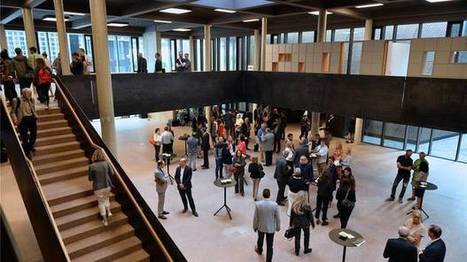


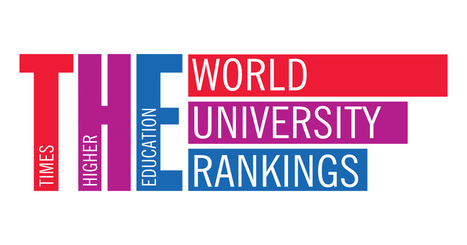
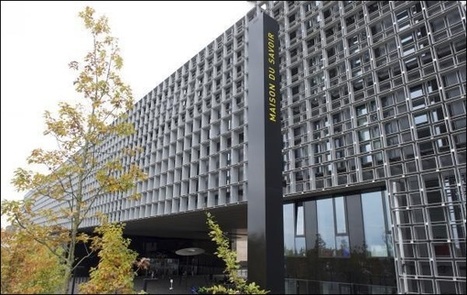
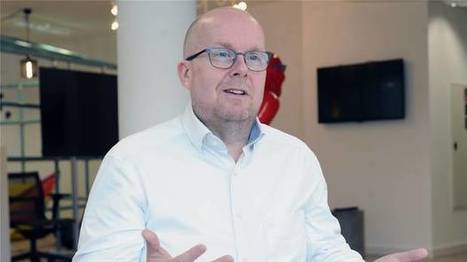
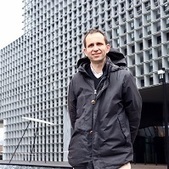
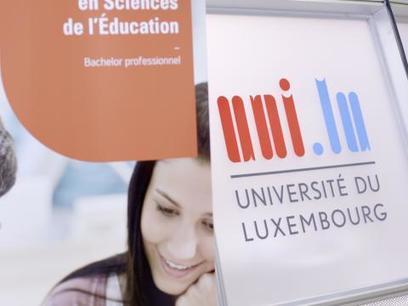

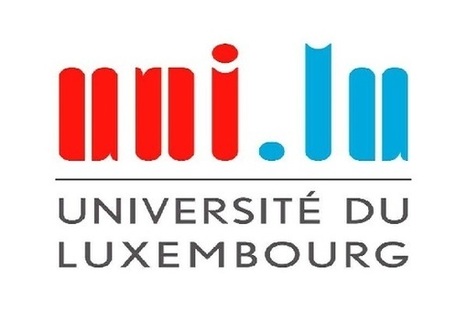

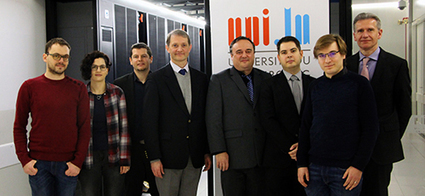


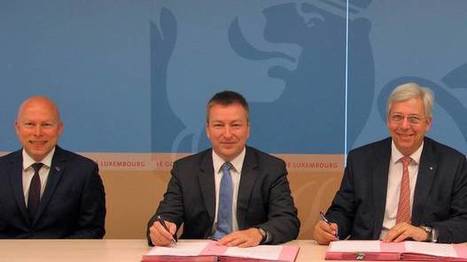
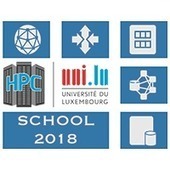


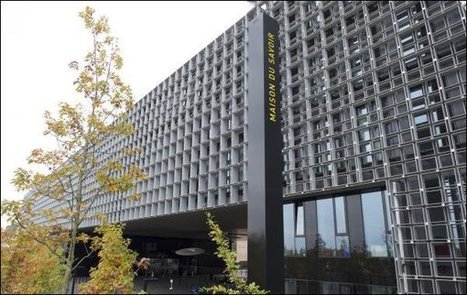


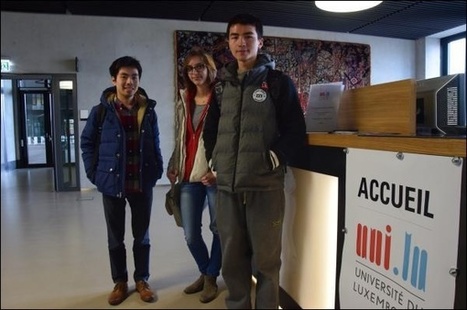
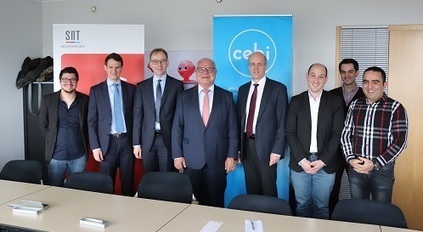









Auf dem Uni-Campus in Belval: „Maison du Nombre, des Arts et des Étudiants“ eingeweiht
Als ein „wichtigen Teil im Infrastrukturpuzzle“ auf Belval hat Luc Dhamen, Direktor des „Fonds Belval“ am Mittwoch die Einweihung der „Maison du Nombre, des Arts et des Étudiants“ bezeichnet. Der Bau mit der markanten, schimmernden Fassade gleich neben der „Maison du Savoir“ beherbergt einerseits Konferenz- und Unterrichtsräume, Forschungseinheiten für Informatik, Ingenieurwissenschaften und Mathematik oder auch das „Interdisciplinary Centre for Security, Reliability and Trust“ (SnT).
Auf der anderen Seite soll das 83 Millionen Euro-Gebäude auch Platz zum Entfalten des Studentenlebens bieten. Der Festsaal kann zu diesem Zweck für Konzerte, Aufführungen oder Feiern genutzt werden, es gibt eine „Student Lounge“, Bereiche zum Entspannen aber auch zum Treffen, etwa für die Studentenvertretung, die mit dem zum 1. August in Kraft tretenden neuen Universitätsgesetz auch durch ihren Präsidenten im Aufsichtsrat der Universität Luxemburg vertreten sein wird. Uni-Rektor Prof. Dr. Stéphane Pallage meinte, es gebe nicht viele Orte auf der Welt, wo sich Studenten über einen derart schönen Campus freuen könnten.
„Dieser Ort wird ganz klar das Herz des Campus sein“, führte Pallage aus, der sich bei der Einweihungszeremonie auch zu jenen zählte, die an dieser Uni gerne wieder Student wären.
Learn more / En savoir plus / Mehr erfahren:
https://www.scoop.it/t/luxembourg-europe/?&tag=University+Luxembourg